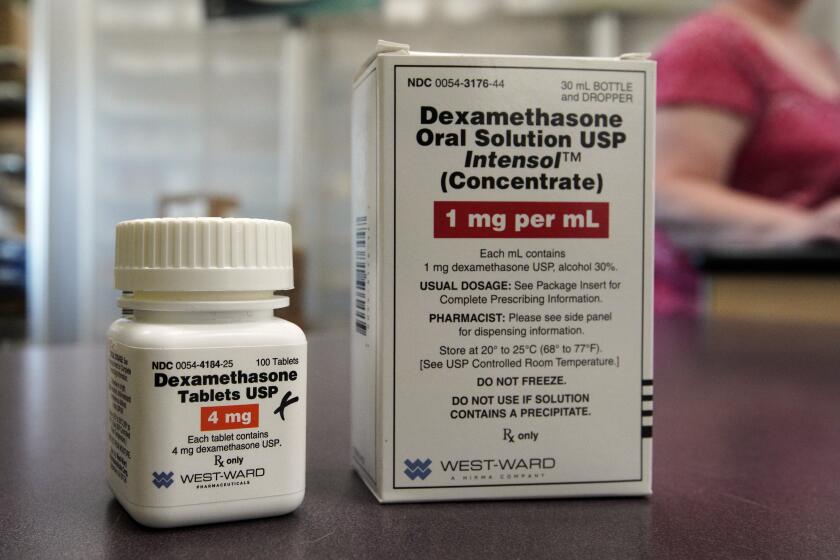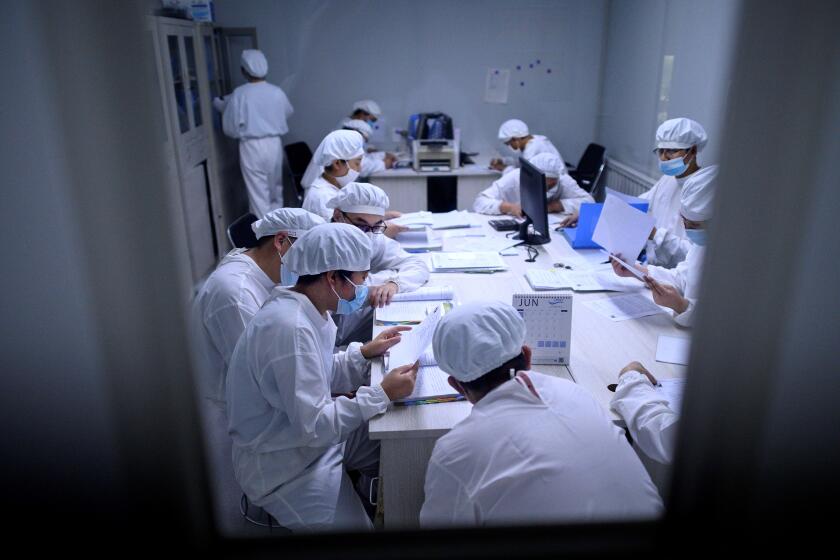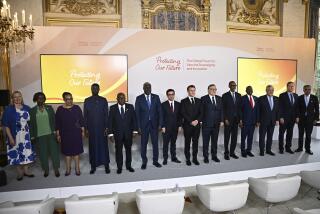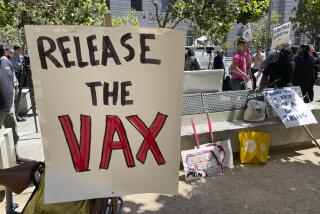Race for coronavirus vaccine could leave some countries behind
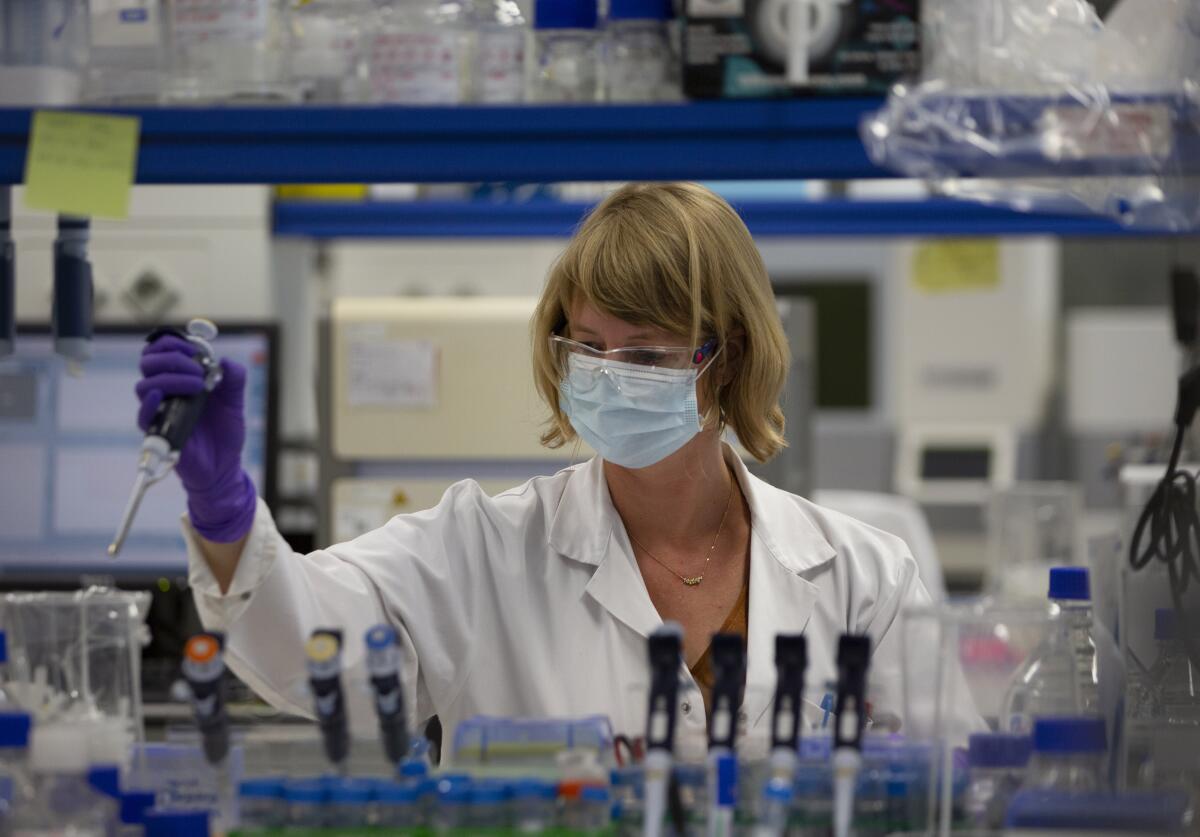
- Share via
LONDON — As the race intensifies for a vaccine against the new coronavirus, rich countries are rushing to place advance orders for the inevitably limited supply to guarantee their citizens get immunized first — leaving significant questions about whether developing countries will get any vaccines in time to save lives before the pandemic ends.
Earlier this month, the United Nations, the International Red Cross and Red Crescent, and others said it was a “moral imperative” that everyone have access to a “people’s vaccine.” But such grand declarations are unenforceable, and without a detailed strategy, the allocation of vaccines could be inequitable and extremely messy, said health experts.
“We have this beautiful picture of everyone getting the vaccine, but there is no road map on how to do it,” said Yuan Qiong Hu, a senior legal and policy advisor at Doctors Without Borders in Geneva. Few measures have been taken to resolve numerous problems for achieving fair distribution, she said.
In the past, Hu said, companies have often applied for patents for nearly every step of a vaccine’s development and production, from the biological material used to the preservative needed to stretch vaccine doses to even how the shots are administered.
“We can’t afford to face these multiple layers of private rights to create a ‘people’s vaccine,’” she said.
Speaking at a vaccine summit earlier this month that addressed the thorny issue of equitable distribution, Ghanaian President Nana Akufo-Addo agreed.
“Only a people’s vaccine with equality and solidarity at its core can protect all of humanity from the virus,” he said.
The steroid dexamethasone can be lifesaving for patients with severe COVID-19. It may also help researchers learn more about the disease and how to treat it.
At a summit with African leaders on Wednesday, Chinese President Xi Jinping said countries in Africa would be “among the first to benefit” once a COVID-19 vaccine is developed and deployed in China, but no deals were announced to back up his promise.
Worldwide, about a dozen potential COVID-19 vaccines are in early stages of testing. While some could move into late-stage testing later this year if all goes well, it’s unlikely any would be licensed before early next year at the earliest. Still, numerous rich countries have already ordered some of these experimental shots and expect delivery even before they are granted marketing approval.
Britain and the U.S. have spent millions of dollars on various vaccine candidates, including one being developed by Oxford University and manufactured by AstraZeneca. In return, both countries are expected to get priority treatment; the British government declared that if the vaccine proves effective, the first 30 million doses would be earmarked for Britons.
China races against the U.S. and others to make the COVID-19 vaccine first, promoting itself as a benevolent vaccinator for the developing world.
Separately AstraZeneca signed an agreement to make at least 300 million doses available for the U.S., with the first batches delivered as early as October. In a briefing Tuesday, senior Trump administration officials said there will be a tiered system to determine who in America is offered the first vaccine doses. Tiers likely would include groups most at risk of severe disease and workers performing essential services.
Last week, the European Union moved to ensure its own supply. On Saturday, AstraZeneca struck a deal with a vaccines group forged by Germany, France, Italy and the Netherlands to secure 400 million doses by the end of the year.
Among several global efforts underway to try to ensure developing countries don’t get left behind is an “advance market commitment” from the vaccines alliance GAVI, whose chief executive has warned countries about the dangers of vaccines not being available globally.
“Even if a few countries go ahead and have vaccines, if there are raging outbreaks in other places ... that is going to continue to threaten the world and the return to normality,” said Seth Berkley, the GAVI chief executive.
GAVI and partners have inked a $750-million deal with AstraZeneca to supply 400 million doses by the end of 2020. The Anglo-Swedish pharma giant has also agreed to license its vaccine to India’s Serum Institute for the production of 1 billion doses.
Johnson & Johnson plans to make its coronavirus shot for poor countries at a not-for-profit price, because of the complexity of the technology and expertise needed, said the company’s chief scientific officer, Dr. Paul Stoffels. Likewise, AstraZeneca has pledged to make the vaccine available at no profit during the pandemic.
The World Health Organization and others have called for a COVID-19 “patents pool,” where intellectual property rights would be surrendered so pharmaceuticals could freely share data and technical knowledge. Numerous countries, including Australia, Brazil, Canada and Germany, have already begun revising their licensing laws to allow them to suspend intellectual property rights if authorities decide there is an overwhelming need given the pandemic.
But the response from the industry has been lukewarm.
Executives at Pfizer and some other major drug makers say they oppose suspending patent rights for potential COVID-19 vaccines.
Health officials worry what that might mean for divvying up supplies of a vaccine arguably needed by every country on the planet.
“We can’t just rely on goodwill to ensure access,” said Arzoo Ahmed, of Britain’s Nuffield Council on Bioethics, noting that precedents of how innovative drugs have been distributed are not encouraging. “With HIV/AIDS, it took 10 years for the drugs to reach people in lower-income countries.”
African nations have already been at the back of the line for medical supplies in the pandemic and “it will be worse if a vaccine is found,” UNAIDS chief Winnie Byanyima told reporters Thursday. “We can’t afford to be in the back of the queue.”
Other experts pointed out that there are billions of taxpayer dollars devoted to every stage of vaccine development, but little oversight over how the funds are spent and few guarantees the inoculations will get to those who need them most.
“We don’t know what the process will look like or how transparent it will be,” said Suerie Moon, co-director of the Global Health Centre at the Graduate Institute Geneva.
The World Health Organization is currently working on developing an “allocation framework” for how coronavirus vaccines should be given out, said Dr. Soumya Swaminathan, the U.N. health agency’s chief scientist. But this guidance would not be binding.
Swaminathan said she hoped there might be 2 billion doses available for vulnerable and priority health workers globally by the end of next year and that WHO would propose how they might be distributed.
“Countries need to agree and come to a consensus,” she said. “That’s the only way this can work.”
More to Read
Sign up for Essential California
The most important California stories and recommendations in your inbox every morning.
You may occasionally receive promotional content from the Los Angeles Times.
